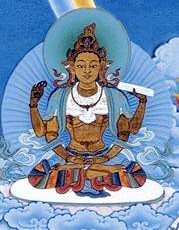Prajnaparamita: Difference between revisions
Jump to navigation
Jump to search
mNo edit summary |
mNo edit summary |
||
| Line 1: | Line 1: | ||
[[Image:Prajnaparamita.jpg|frame| | [[Image:Prajnaparamita.jpg|frame|Prajñaparamita deity]] | ||
'''Prajñaparamita''' (Skt. '' | '''Prajñaparamita''' (Skt. ''prajñāpāramitā''; Tib. [[ཤེར་ཕྱིན་]], [[ཤེས་རབ་ཀྱི་ཕ་རོ་ཏུ་ཕྱིན་པ་]], ''sherchin''; [[wyl.]] ''sher phyin'', ''sherab kyi parol tu shinpa'') means 'Perfection of Wisdom', or more literally, ‘transcendent wisdom’. It refers to: | ||
#the sixth of the [[paramitas]]: perfect non-conceptual wisdom. | #the sixth of the [[paramitas]]: perfect non-conceptual wisdom. | ||
#the class of Buddhist literature that was mainly discovered by [[Nagarjuna]] in the second century. Its central topic is [[emptiness]]. | #the class of Buddhist literature that was mainly discovered by [[Nagarjuna]] in the second century. Its central topic is [[emptiness]]. | ||
| Line 32: | Line 32: | ||
[[Category:Key Terms]] | [[Category:Key Terms]] | ||
[[Category:Paramitas]] | |||
[[Category:Prajnaparamita]] | |||
[[Category:Buddhas and Deities]] | [[Category:Buddhas and Deities]] | ||
Revision as of 14:09, 14 February 2012

Prajñaparamita (Skt. prajñāpāramitā; Tib. ཤེར་ཕྱིན་, ཤེས་རབ་ཀྱི་ཕ་རོ་ཏུ་ཕྱིན་པ་, sherchin; wyl. sher phyin, sherab kyi parol tu shinpa) means 'Perfection of Wisdom', or more literally, ‘transcendent wisdom’. It refers to:
- the sixth of the paramitas: perfect non-conceptual wisdom.
- the class of Buddhist literature that was mainly discovered by Nagarjuna in the second century. Its central topic is emptiness.
- the female deity who is the embodiment of transcendent wisdom.
Definition
"Prajnaparamita is the wisdom of directly realizing the non-conceptual simplicity of all phenomena, which has arrived at, or will lead one to, non-abiding nirvana."[1]
Subdivisions
According to the teachings of the Abhisamayalankara, there are four subdivisions:
- natural prajnaparamita
- scriptural prajnaparamita
- path prajnaparamita
- resultant prajnaparamita
Literature
- Heart Sutra
- Perfection of Wisdom Sutra in One Hundred Thousand Lines
- Perfection of Wisdom Sutra in Twenty-five Thousand Lines
- Perfection of Wisdom Sutra in Eight Thousand Lines
- Seventeen mothers and sons
- Verse Summary of the Prajnaparamita
Notes
- ↑ From The Words of Jikme Chökyi Wangpo by Khenpo Tsöndrü.